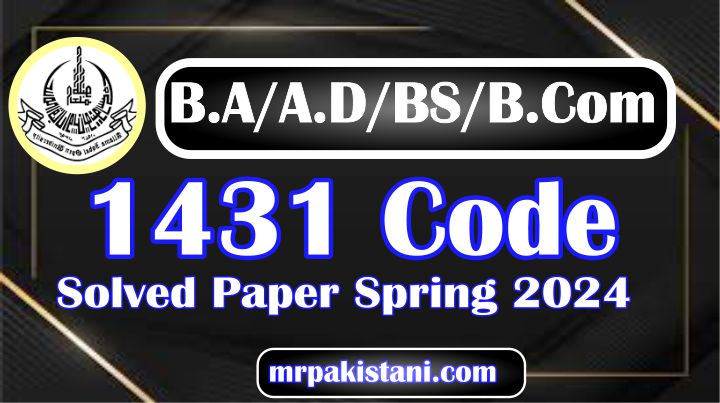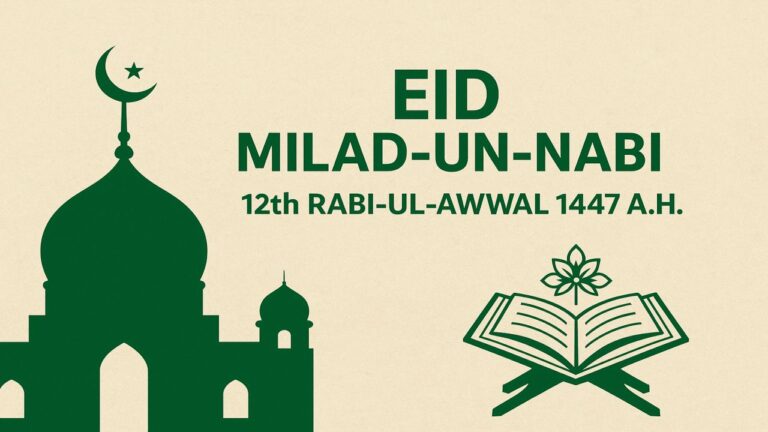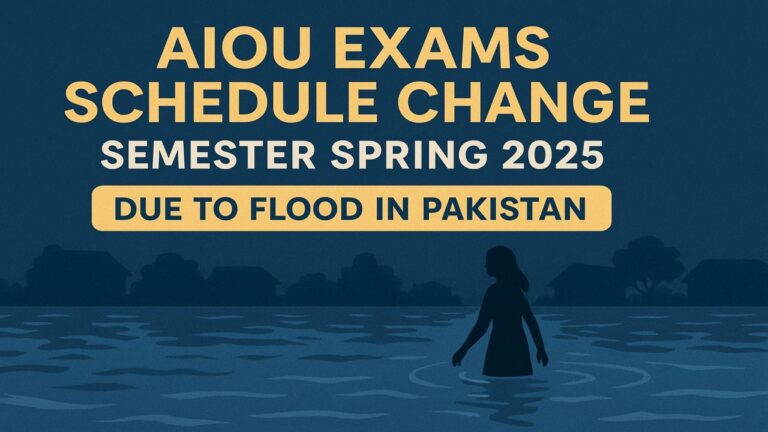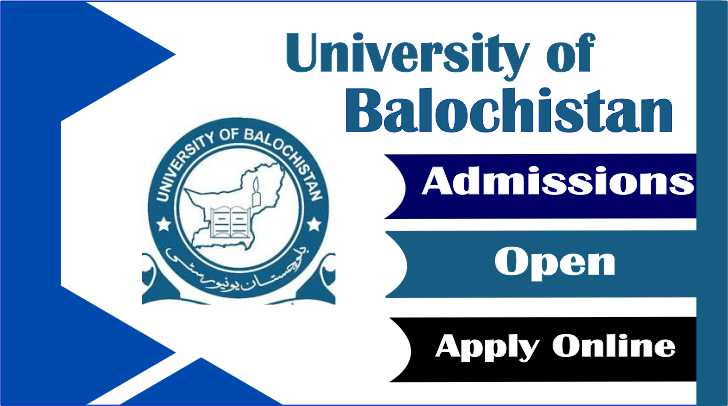1423 Code Compulsory English-I Autumn 2021 Solved Paper
Get a solid grip on your English preparation with the AIOU 1423 Code Compulsory English-I Autumn 2021 Solved Paper . This solved paper is an excellent aid for students enrolled in BA, ADP, and BS programs, offering clear and concise answers based on the actual Autumn 2021 exam. It covers a variety of sections such as grammar usage, sentence structure, comprehension passages, and short essay writing. Designed for smart revision, this resource helps you focus on frequently asked topics and improves your understanding of how to approach different question formats confidently.
To discover more solved past papers and educational content for other AIOU subjects, visit mrpakistani.com. Also, enhance your learning experience by subscribing to our YouTube channel Asif Brain Academy where we share helpful tutorials, assignment guidance, and exam tips.
| 1423 Code Solved Paper Autumn 2021 | |
|---|---|
| Level | BA/BS |
| Semester | Autumn 2021 |
| Subject/Course Code | Compulsory English-I (1423) |
| Maximum Marks | 100 |
| Pass Marks | 50 |
| Medium of Instruction | Compulsory English I |
| ATTEMPT All QUESTIONS | |
AOIU 1423 Code Autumn 2021 Old Paper – Compulsory English-I
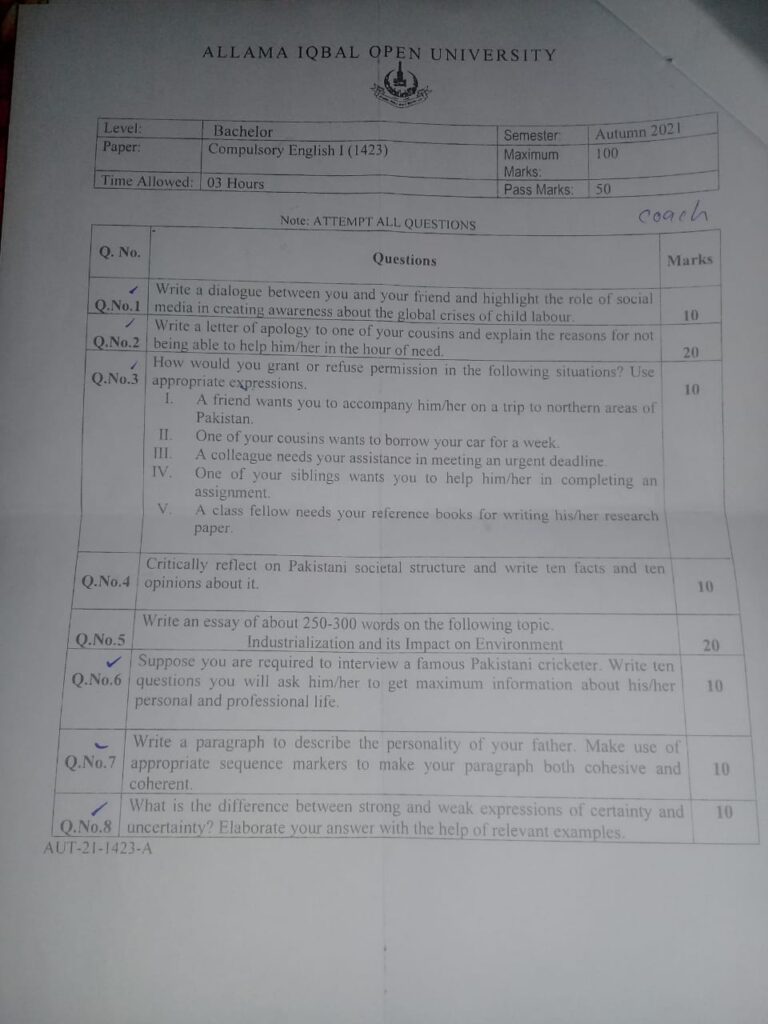
AOIU 1423 Code Autumn 2021 Solved Paper – Compulsory English-I
Write a dialogue between you and your friend and highlight the role of social media in creating awareness about the global crises of child labour.
Dialogue:
Ali: Assalamu Alaikum Sara! How are you doing these days?
Sara: Wa Alaikum Assalam, Ali! I am doing well, Alhamdulillah. These days I am actively following some awareness campaigns on social media about child labour.
Ali: That’s good to hear. Child labour is indeed a serious issue. I believe as Muslims, we should raise our voices against such injustices. Doesn’t Islam teach us to protect the weak and care for orphans and children?
Sara: Absolutely, Ali. Islam strongly condemns injustice and exploitation. The Holy Prophet Muhammad (ﷺ) always emphasized kindness towards children and never approved of burdening them with responsibilities beyond their capacity.
Ali: Yes, and now social media platforms are becoming powerful tools to raise awareness. I saw a post on Instagram that showed how children in some countries are forced to work in mines and factories. It was very painful to watch.
Sara: Same here. But Alhamdulillah, many Islamic organizations and individuals are using social media to spread messages from the Qur’an and Hadith about justice, compassion, and human rights, especially for children.
Ali: That’s true. Social media also helps us share videos, articles, and statistics that highlight the global crisis of child labour. It educates people and motivates them to take action — even simple steps like donating, signing petitions, or just spreading awareness.
Sara: And the best part is that even young Muslims like us can play a role. By sharing authentic information and Islamic perspectives, we can remind the Ummah that helping the oppressed is not just a good deed, it’s our duty.
Ali: SubhanAllah, what a great reminder! The Prophet (ﷺ) said: *“Help your brother, whether he is an oppressor or oppressed.”* And when asked how to help the oppressor, he replied: *“By stopping him from oppressing.”* Child labour is a form of oppression and we must raise our voices against it.
Sara: Very true, Ali. May Allah accept our efforts and guide us all to stand against all forms of injustice.
Ali: Ameen. Let’s continue spreading awareness and encourage others to do the same. Social media, when used wisely, can become a sadaqah jariyah (ongoing charity) for us.
Write a letter of apology to one of your cousins and explain the reasons for not being able to help him/her in the hour of need.
Letter:
House No. 27-B,
Muslim Town,
Lahore.
28th May, 2025.
Dear Cousin Ayesha,
Assalamu Alaikum wa Rahmatullah!
I hope this letter finds you in the best of health and Imaan. I am writing to you with a heavy heart to express my sincere apologies for not being able to help you in your hour of need. I recently came to know that you were going through a difficult time and needed my support, and I regret deeply that I couldn’t be there for you when you expected me to be.
I understand how much you trusted me, and it hurts me to know that I couldn’t live up to that trust. The reason I couldn’t help you was due to a sudden health issue in our family. My mother had to undergo an emergency medical procedure, and I had to take full responsibility at home, from hospital visits to managing daily tasks. Everything happened so quickly that I couldn’t even inform you properly, and for that, I am extremely sorry.
As Muslims, we are taught by our beloved Prophet Muhammad (ﷺ) to always stand by our relatives, especially in their time of need. I am fully aware that I fell short of this important duty. Allah commands us in the Qur’an to uphold the ties of kinship (*Silah Rehmi*), and I feel very ashamed that I could not fulfil my role as your cousin and friend.
I seek your forgiveness from the bottom of my heart. Please know that it was never my intention to leave you alone. If there is anything I can do now to make up for it, I will be more than willing. In shaa Allah, I promise to always be available for you in the future and never let you feel alone again.
May Allah (SWT) bless you with strength, ease your difficulties, and increase our love and understanding as a family. Please do forgive me and remember me in your prayers.
With heartfelt apologies and lots of duas,
Your cousin,
**Fatima**
How would you grant or refuse permission in the following situations? Use appropriate expressions.
- A friend wants you to accompany him/her on a trip to northern areas of Pakistan.
- One of your cousins wants to borrow your car for a week.
- A colleague needs your assistance in meeting an urgent deadline.
- One of your siblings wants you to help him/her in completing an assignment.
- A class fellow needs your reference books for writing his/her research paper.
1. A friend wants you to accompany him/her on a trip to northern areas of Pakistan.
→ I would really love to join you, but unfortunately, I have some prior family commitments. In shaa Allah, we can plan another trip together in the near future.
2. One of your cousins wants to borrow your car for a week.
→ I’m sorry, but I won’t be able to lend you the car for a week as I need it for my own daily tasks. I hope you understand.
3. A colleague needs your assistance in meeting an urgent deadline.
→ Absolutely, I’m here to help. Let’s work together and meet the deadline, In shaa Allah.
4. One of your siblings wants you to help him/her in completing an assignment.
→ Sure, I’ll definitely help you. Let’s work on it after Maghrib prayer. Helping you is both a duty and a joy, Alhamdulillah!
5. A class fellow needs your reference books for writing his/her research paper.
→ Yes, you may take my reference books. Just make sure to handle them with care and return them on time. May Allah grant you success in your research.
Critically reflect on Pakistani societal structure and write ten facts and ten opinions about it.
Ten Facts about Pakistani Societal Structure:
1. Pakistan is a multicultural society with various ethnic groups such as Punjabis, Sindhis, Balochis, Pashtuns, and Muhajirs.
2. The Pakistani society is predominantly Muslim, with over 96% of the population following Islam.
3. Joint family systems are still common in rural areas and among traditional households.
4. Urdu is the national language, while English is used for official and educational purposes.
5. There is a growing youth population, with over 60% of Pakistanis under the age of 30.
6. Pakistan ranks low on the Gender Equality Index, reflecting issues related to women’s rights and representation.
7. Education disparity exists between urban and rural areas, and also between male and female literacy rates.
8. Social class division is visible in terms of access to healthcare, education, and employment opportunities.
9. Pakistani society is largely patriarchal, with men having more authority in both public and private life.
10. Religion and cultural traditions play a significant role in shaping social behaviors and family values.
Ten Opinions about Pakistani Societal Structure:
1. Pakistani society needs to move towards more inclusive and equal opportunities for all genders.
2. The joint family system, though traditional, can sometimes hinder personal growth and privacy.
3. There is a need to improve tolerance for religious and ethnic minorities to strengthen national unity.
4. Society puts excessive pressure on students to pursue specific careers, especially in medicine and engineering.
5. Cultural values should evolve with time, particularly concerning women’s participation in the workforce.
6. The education system should be reformed to focus on critical thinking rather than rote learning.
7. There is a growing gap between rich and poor, which threatens social harmony and fairness.
8. Traditional customs often overshadow Islamic teachings about equality and justice.
9. Urbanization is changing societal norms, but rural areas still struggle with outdated practices.
10. Media has a strong influence on shaping societal perceptions and should promote positive values and social awareness.
Note: These reflections are based on personal observation and general trends. Societal structures are complex and may vary from region to region across Pakistan.
Write an essay of about 250-300 words on the following topic:
Industrialization and its Impact on Environment
Industrialization and its Impact on Environment
Industrialization has been a key factor in the development and economic progress of many nations, including Pakistan. It has created numerous job opportunities, improved living standards, and enhanced technological advancements. However, alongside these benefits, industrialization has also caused serious harm to the environment.One of the most alarming effects of industrialization is air pollution. Factories emit large quantities of smoke and harmful gases such as carbon dioxide, sulfur dioxide, and nitrogen oxides, which not only pollute the air but also contribute to global warming and acid rain. This affects human health, causes respiratory diseases, and damages crops and forests.Water pollution is another major concern. Industrial waste, including chemicals and toxic substances, is often dumped into rivers, lakes, and oceans without proper treatment. This endangers aquatic life and contaminates water sources used by people for drinking and agriculture.Moreover, industrialization leads to deforestation, as more land is cleared for setting up factories and mining activities. This destroys natural habitats, reduces biodiversity, and disturbs the ecological balance. The loss of trees also contributes to climate change by reducing the Earth’s capacity to absorb carbon dioxide.Noise pollution from heavy machinery and factory operations is yet another consequence, affecting both humans and animals. The constant noise can cause hearing problems, stress, and sleep disturbances.In conclusion, while industrialization plays a vital role in the development of a country, it is crucial to manage it responsibly. Governments and industries must adopt environmentally friendly technologies, enforce strict pollution control laws, and promote awareness among citizens. Sustainable industrial practices are the need of the hour to protect our environment for future generations.
Suppose you are required to interview a famous Pakistani cricketer. Write ten questions you will ask him/her to get maximum information about his/her personal and professional life.
- Can you please tell us about your early life and how you got interested in cricket?
- Who was your inspiration or role model when you started your cricket journey?
- How did your family support you in becoming a professional cricketer?
- What was your debut match like, and how did you feel representing Pakistan for the first time?
- Which moment in your career do you consider the most memorable and why?
- What challenges did you face in your career, and how did you overcome them?
- How do you maintain your fitness and performance both on and off the field?
- What message do you have for the youth of Pakistan who dream of becoming cricketers?
- Besides cricket, what other hobbies or interests do you have in your personal life?
- What are your future goals after retiring from professional cricket?
Write a paragraph to describe the personality of your father. Make use of appropriate sequence markers to make your paragraph both cohesive and coherent.
My father is a remarkable person with many admirable qualities. Firstly, he is very hardworking and always dedicated to his responsibilities. Moreover, he is extremely honest, which has earned him respect from everyone around him. In addition, he is very kind-hearted and always ready to help others in need. Furthermore, my father is a wise man who gives excellent advice whenever I face any problem. Besides that, he is very patient and never loses his temper, even in difficult situations. Finally, he is a loving and caring father who always supports me and encourages me to do my best. In conclusion, my father’s personality is a perfect example for me to follow in my life.
What is the difference between strong and weak expressions of certainty and uncertainty? Elaborate your answer with the help of relevant examples.
Expressions of certainty and uncertainty are used to indicate how confident or unsure a speaker is about a statement or situation. The difference between strong and weak expressions lies in the degree of confidence or doubt they convey.
Strong expressions of certainty show a high level of confidence that something is true or will happen. They leave little or no room for doubt. Common words and phrases used for strong certainty include: definitely, certainly, undoubtedly, surely, without a doubt. For example:
– “She will definitely pass the exam because she has prepared very well.”
– “The sun certainly rises in the east.”
On the other hand, weak expressions of certainty indicate a lower level of confidence. They show that the speaker thinks something is likely or possible but is not completely sure. Words used include: probably, likely, apparently, seems, looks like. For example:
– “He will probably arrive late because of the traffic.”
– “It seems that they are not coming to the party.”
Strong expressions of uncertainty emphasize a clear doubt or disbelief about a fact or event. Words such as impossible, no way, hardly, definitely not express strong uncertainty. For example:
– “It is impossible for him to finish the work today.”
– “There is no way she forgot her appointment.”
Meanwhile, weak expressions of uncertainty express mild doubt or hesitation and are less direct. Examples include: might not, could be, may not, unsure, uncertain. For example:
– “I might not attend the meeting if I am feeling unwell.”
– “We are unsure about the final date of the event.”
In summary, the key difference between strong and weak expressions of certainty and uncertainty is the level of confidence or doubt communicated by the speaker. Strong expressions assert definite beliefs or disbeliefs, while weak expressions suggest possibility or hesitation.







